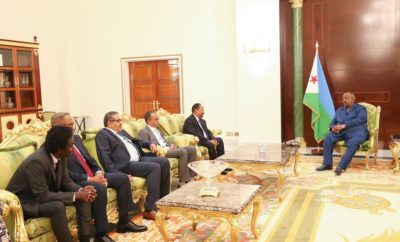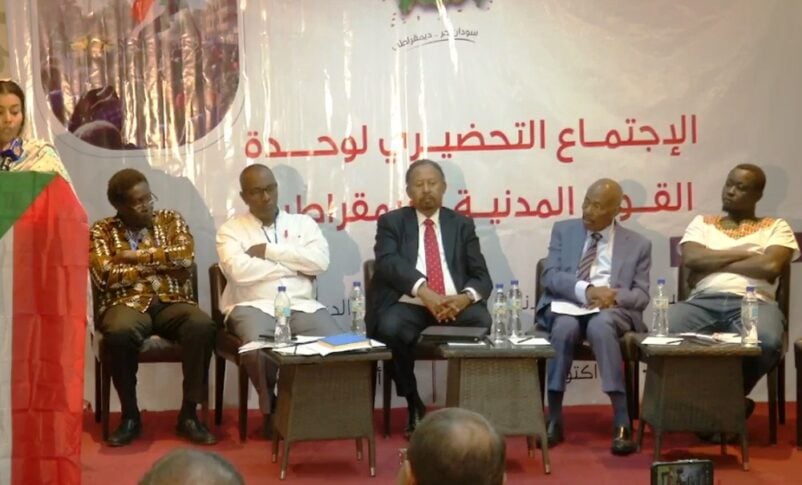Sudan Talks Between Military Leaders Cannot Bring Genuine Peace
Civilian democratic forces are demanding inclusion in proposed discussions in Djibouti

All Global Research articles can be read in 51 languages by activating the Translate Website button below the author’s name (only available in desktop version).
To receive Global Research’s Daily Newsletter (selected articles), click here.
Click the share button above to email/forward this article to your friends and colleagues. Follow us on Instagram and Twitter and subscribe to our Telegram Channel. Feel free to repost and share widely Global Research articles.
New Year Donation Drive: Global Research Is Committed to the “Unspoken Truth”
***
Since April 15 the two most armed institutions inside the Republic of Sudan have turned the weapons on each other resulting in massive deaths, destruction and dislocation in this oil-rich state of 46 million people.
The Sudanese Armed Forces (SAF) and the Rapid Support Forces (RSF) have tens of thousands of soldiers now fighting over the future direction of the country.
After nine months of warfare, which has been centered in the areas around Khartoum, al-Jazirah state and in sections of the Darfur region, the RSF leader Mohamed Dagalo (Hemedti) indicated that he was interested in unconditional negotiations on ending the conflict. Former interim Prime Minister Abdalla Hamdok put forward a framework for the beginning of talks which drew the support of the RSF leader.
In a report published by the Sudan Tribune on January 4:
“The Coordination of Civilian Democratic Forces (Taqaddum) has called on the Chair of the Intergovernmental Authority on Development (IGAD), Ismail Omar Guelleh, to ensure civilian participation in the upcoming meeting between the leaders of the Sudanese military and the Rapid Support Forces (RSF). This request comes as IGAD is facilitating direct talks between Sudanese Army Chief Abdel Fattah al-Burhan and RSF Commander Mohamed Hamdan Dagalo, ‘Hemedti,’ which were originally scheduled for late December but were postponed. Saleh Ammar, a spokesman for the Civil Forces Alliance in Eastern Sudan and a member of the Tagaddum delegation that met with Djiboutian President Guelleh, stated that the demand for civilian participation was a key topic of discussion during the meeting. Ammar further indicated that all IGAD member states support the inclusion of civilians in all stages of the political process.”
Although these events have provided a glimpse of hope among Sudanese for a rapid conclusion to the war, the loss of life and property due to the RSF-SAF war has been a severe setback to the democratic movement which arose five years ago. During the concluding weeks of 2018 demonstrations erupted in Sudan over the rising cost of living among workers and professional people.
By April 2019, longtime President Omar Hassan al-Bashir was overthrown by his colleagues since the initial protests sparked by runaway inflation soon turned political by demanding the resignation of the then head-of-state. Thinking that the removal of al-Bashir would halt the mass demonstrations in Sudan, a Transitional Military Council (TMC) was established after the coup of April.
Nonetheless, even after the putsch, the popular resistance committees remained in the streets holding a sit-in and street occupation outside the defense headquarters in Khartoum. After two months on June 3, apparently the SAF and RSF made a decision to remove the demonstrators from the capital. This military and security action proved to be extremely bloody. Over 100 people were reportedly killed prompting another political crisis in Sudan.
The repressive measures taken by the security forces in early June 2019 were designed to prevent a real democratic transition in Sudan. The military has its own interests in the economic structures of the country. Ousted President al-Bashir was wanted by the International Criminal Court (ICC) which could implicate other top-level military officials if the former leader was ever sent to The Hague to face trial. Al-Bashir has not been sent to the Kingdom of the Netherlands to answer charges against him after nearly five years since his removal.
Efforts by neighboring Federal Democratic Republic of Ethiopia and the 55 member-states African Union (AU) eventually resulted in a negotiated agreement for the establishment of a Transitional Sovereign Council (TSC) which ostensibly would turn over the governance of the state to a democratically elected administration after three years. This struggle over the character of the transitional process continued up until the April 15 outbreak of violence between the RSF and the SAF.
After the collapse of the first transitional process in October 2021 and the removal of interim Prime Minister Abdalla Hamdok, the political situation remained stalled. Therefore, when the eruption took place on April 15, the democratic movement was not in any position to push towards a peaceful resolution of the intra-military conflict.
Addis Ababa Declaration
On January 2, a statement was issued by a coalition of mass organizations called the Coordination Body of the Democratic Civil Forces (Taqaddum) and the RSF in Ethiopia. The aim of the declaration was to set out principles for the end of the war between the military factions.
Sudan former PM with Coordination Body of the Democratic Civil Forces (Taqaddum) (Source: Abayomi Azikiwe)
Taqaddum was formed in October 2023 in Addis Ababa in an attempt to unite the civil society groupings which had been fractured in the aftermath of the failure in deciding on the details of the transitional process. Even after the removal of Hamdok in October 2021, further fissures occurred within the democratic movement in Sudan.
However, Malik Agar, the current Deputy Chairperson of the Sovereign Council under the leadership of SAF General Abdel-Fattah al-Burhan, rejected the Addis Ababa Declaration saying that the groups which signed the statement were already aligned with the RSF. Agar in a press statement on January 3 said that the proposed meeting between Al-Burhan and Delgado in Djibouti was not confirmed. Agar noted that the meeting would be based upon the Jeddah Agreement which was discussed after the fighting began in 2023.
The Agar statement said,
“We have made our conditions clear and stated upfront that there will be no negotiations without the immediate withdrawal of the RSF from homes, institutions, and cities, including Wad Madani and the cities they occupy in Darfur. If this happens, there will be a second, third, and fourth stage. We still have time to stop the war and time to end it.”
General al-Burhan echoed the sentiment of Agar during a lecture delivered to soldiers in the SAF on January 5. He described the RSF leader as a “traitor” who needs to be held accountable for his actions. See this.
Meanwhile the actual text of the Addis Ababa Declaration read in part as follows:
“Acknowledging that communication and political dialogue between all civil forces, who truly believe in democratic transformation, and the leaders of the warring military forces, is inevitable to stop the war, tackle its devastating impact, realize peace, and restore the path of democratic transformation; We, in Taqaddum and RSF, have determined to end this war and make it the last war in Sudan; and to complete and deepen the course of the December Revolution, by achieving the well-deserved democratic civil rule, equal citizenship, just distribution of power and wealth, economic prosperity, solid peace, and sustainable solutions to Sudan’s crisis.”
Peaceful Resolution Would Benefit the Entire Region
The scheduled meeting between al-Burhan and Hemedti in December did not materialize. The Inter-Governmental Authority on Development (IGAD), a regional East African organization, was set to sponsor the talks between the two military belligerents in Djibouti.
There is a pressing desire both inside the country and regionally for a peaceful resolution to the war. Official statistics reveal that approximately 12,000 people have been killed in the fighting since April 15. Tens of thousands more are suffering from injuries and gunshot wounds.
United Nations estimates say that since the beginning of the fighting, 7.2 million people have been dislocated with 1.4 million of them crossing the border into other neighboring states. Societal institutions including healthcare, education, civil services and humanitarian relief agencies have been paralyzed due to the conflict.
Contiguous states in East and Central Africa were already faced with development issues amid the post-pandemic situation and the problems centered around severe weather events including drought. Unfortunately, the AU and the other official regional groupings have failed in their efforts to end the war.
Consequently, it is essential that these official entities along with the political parties, coalitions and civil society groups continue to work for an end to the war. However, the ongoing military dominance of Sudanese politics must be effectively ended to place the country on a path of sustainable peace and development.
*
Note to readers: Please click the share button above. Follow us on Instagram and Twitter and subscribe to our Telegram Channel. Feel free to repost and share widely Global Research articles.
Abayomi Azikiwe is the editor of the Pan-African News Wire. He is a regular contributor to Global Research.
Featured image: Sudan delegation meets with Djibouti President (Source: Abayomi Azikiwe)


